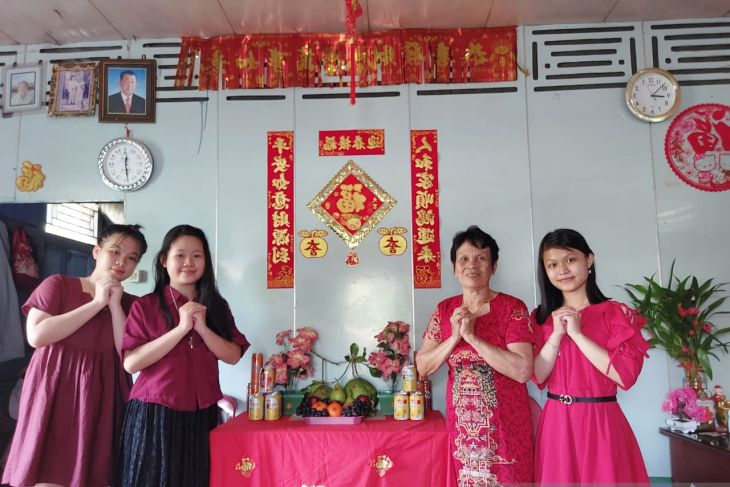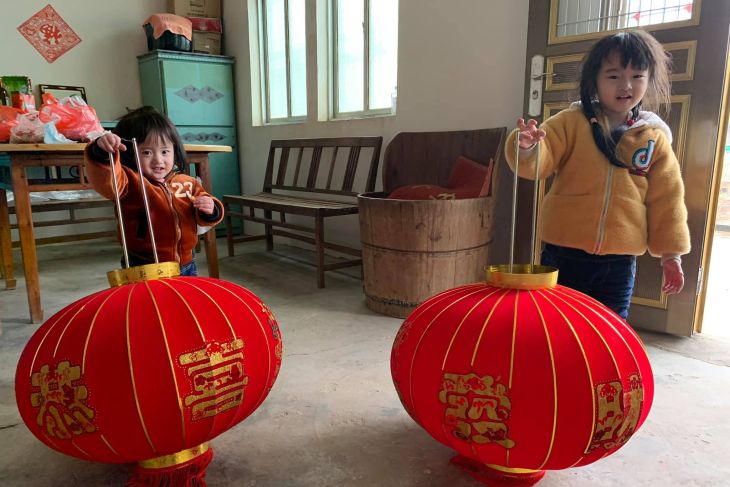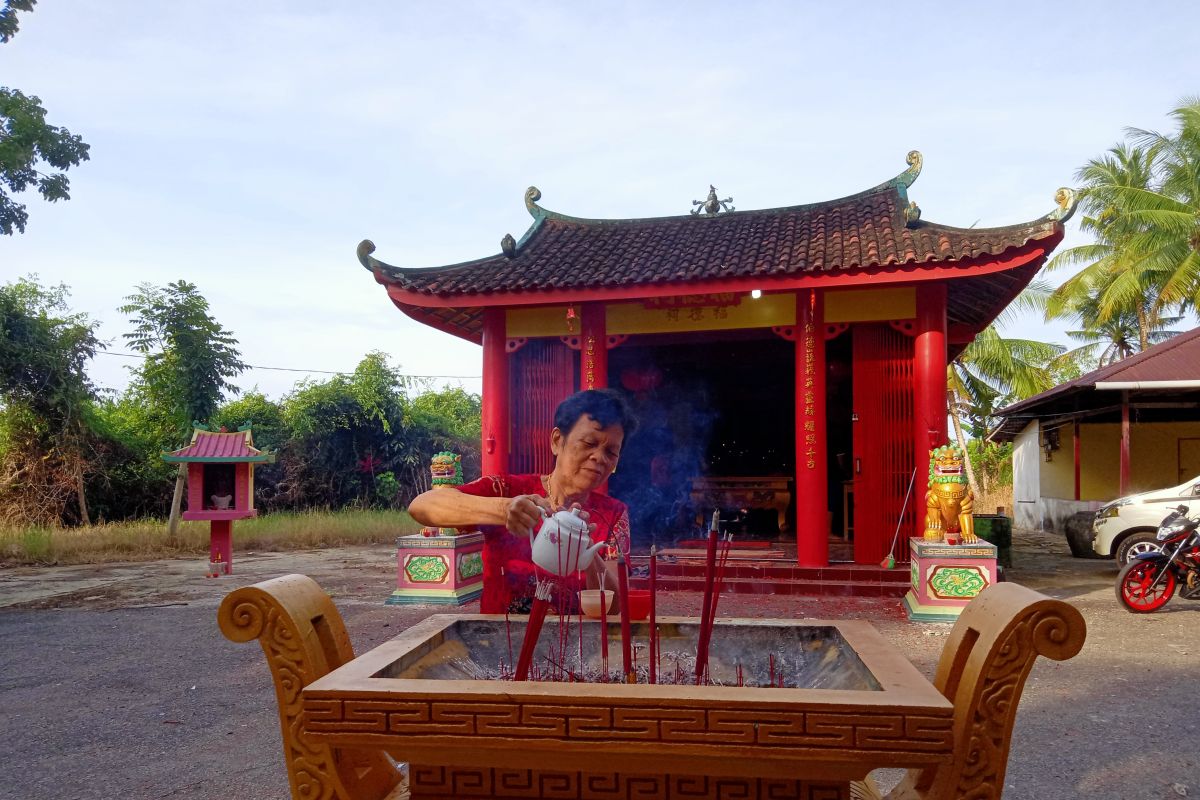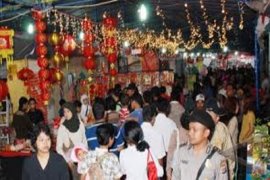Chinese New Year's Eve is known as Chúxī, which means "New Year's Eve."
Every year, Imlek is celebrated on a different date, and this year, it is celebrated on February 1, 2022. The Chinese New Year celebration of 2573 Kongzili this year marks the start of the year of the Water Tiger.
Various special dishes and ornaments with red nuances enliven the Chinese New Year celebrations. Gathering with the family is an important practice followed during Imlek.
Akin to ethnic Chinese in various other countries, Chinese-Indonesian ethnic groups also celebrate Chinese New Year.
People of Chinese descent in Indonesia were again given the freedom to celebrate the Chinese New Year in 2000 during the administration of President Abdurrahman Wahid.
Exemplified herewith are accounts of people that celebrate the Chinese New Year.

Siau Cin, often called Acin, lived in the Selakau area, Sambas, West Kalimantan. Before the Chinese New Year, she usually does some preparations, such as cleaning and decorating the house and also buying clothes. She also readies an array of pastries, snacks, and drinking water to welcome the family, neighbors, and guests. She always buys new clothing that are more identical with the red color and have writings, such as the letters fu or blessing.
Acin and her family eat together to enjoy the special dishes. On that day, the vegetable dishes or side dishes are usually more plentiful and complete.
Acin’s family is grateful for being able to celebrate another new year together. In addition, they visited their relatives and friends. Acin noted that this is not only done during the Chinese New Year celebrations, but most of the other ethnic groups also get involved in doing the same activities.
On the first day of Imlek, at around 7 a.m. local time, Acin and her family went to buy incense and then visited the temple to pray together. Acin said that her parents had since long always gone to pray at the pagoda in the morning. I never asked why it had to be in the morning, I just followed it. However, there were also people that left at around 9 or 10 a.m.
According to Acin, some other rituals are also followed during Imlek, such as not sweeping for three days because there is a belief that if you sweep during the Chinese New Year, your sustenance will be swept out too. That means the fortunes that have come will be wasted. In addition, washing clothes is also prohibited, and there should be no fuss at home. Cutting the hair is also not allowed. People believe that if we cut our hair, our luck this year will be cut off too.
Acin, 20, is a vegetarian. Her favorite dishes during Imlek are Capcay, vegetarian rendang, and KuiFei satay (kuifei is a type of artificial meat made from soybeans). However, for non-vegetarians like her mother and sister prefer dishes, such as steamed fish and chicken soup. That family also likes vegetarian dumplings.
Honestly, for Acin, the most awaited moment during Imlek is getting angpao from the family, relatives, and neighbors. However, she can no longer get angpao if she is already working and has sufficient income, especially if married, because it will then be her turn to give angpao.
Another aspect she was waiting for eagerly was a full family gathering. Every Chinese New Year, her relatives always come home, albeit not all of them.
Acin said the most memorable memories while celebrating Imlek are created by meeting the people, who usually rarely see each other or had not met for years. Moreover, she said her savings increased due to the practice of giving angpao.
Acin’s family still upholds the Chinese tradition, as it has become a hereditary tradition that is always followed and eventually imbibed and had become a habit. She believes that it is good for all of them. She is also sentient of the benefits and advantages of preserving Chinese traditions, one of which is upholding the ties of brotherhood, kinship, and cohesiveness.
The difference in Chinese New Year celebrations before and during pandemic is very pronounced. Before the pandemic, the celebrations were livelier and busier, and activities were conducted normally as usual. People can visit each other and tourism places are also crowded without having to worry about transmitting the virus.
Meanwhile, currently, during the pandemic, Imlek was not as lively as the previous year, and no Cap Go Meh celebrations were held. Acin said when they want to visit relatives or friends, they have to think again. Moreover, walking outside is not easy, with one having to keep a distance, always being vigilant, and wearing a mask.
But of course, there is wisdom behind it all, she stated.
Acin has never celebrated Chinese New Year in China, but one day, she expects to celebrate it there. Looks like it will be very lively and fun anyway, according to Acin.
For Acin, Chinese New Year has several meanings. For instance, it is more synonymous with meeting all family members, being able to strengthen kinship ties, being able to visit places of worship such as pagodas and monasteries, and give offerings in the form of fruits and praying to the God, Goddess, and Bodhisattva Buddha.
During this year's Chinese New Year, Acin is optimistic of being able to surmount the COVID-19 pandemic quickly and all activities returning to normal and everyone always being happy and healthy.

Novita, a resident of the capital city of Jakarta, is also one of those celebrating Chinese New Year in Indonesia.
Welcoming Imlek, Novita always shops for necessary items for Chinese New Year, for instance, hampers for co-workers, friends, and family. He also prepares special dishes to be enjoyed with the family. In addition, Novita exchanges money for hongbao (angpao).
Novita and her family usually eat together at night before and during the Chinese New Year. She has also prepared hongbao for his family, including his children.
Novita’s family always decorates the house with accessories having Chinese nuances. They also visited the graves of their ancestors. Usually, they also light firecrackers before the Imlek dinner or when the Chinese New Year begins. In addition, they go to the temple to seek for their fortune.
Some of her favorite foods during Imlek celebrations are herbal steam chicken, spicy beef stir fry, spicy cooked prawns, Szechuan spicy sour fish, and spicy sour potatoes.
For Novita, the most awaited moment during the Chinese New Year is decorating the house with Chinese New Year knick-knacks that symbolize various blessings and hopes. She also looks forward to giving hongbao or angpao and eating together with family, friends, and colleagues that symbolizes celebration, prosperity, and happiness in togetherness.
She affirmed that the most memorable memories during the Chinese New Year celebrations are the high family values, as kin and relatives can gather on that day.
Novita and her family still uphold Chinese traditions, as her husband comes from China, and they still preserve traditions during the Chinese New Year celebrations.
According Novita, during the two years of the pandemic, there were many differences in the way the Chinese New Year was celebrated.
Before the pandemic, Novita, her husband, and their two children always flew to China to celebrate the Chinese New Year. There, they usually held celebrations at her parents-in-law's house. She noted that the atmosphere of celebrations in China was certainly livelier and very crowded with the presence of relatives. It was very different from the Chinese New Year celebrations in Indonesia.
Novita was unable to express exactly how enthralling the Chinese New Year celebrations were in China, with firecrackers and fireworks illuminating the sky and making the atmosphere even more lively. In addition, Chinese New Year celebrations in China will still go on for almost a month.
For Novita, the Chinese New Year symbolizes happiness, kinship, and prosperity, which is quite lively for all those who celebrate it.
Novita, a mother of two, is optimistic that this year would be bring in more blessings, health, togetherness, and also happiness for all who celebrate.
Related news: Minister advocates health protocol compliance during Chinese New Year
Related news: Despite restrictions, Lunar new year traditions remain strong
Related news: Inside the centuries-old temple in Jakarta on Lunar New Year
Editor: Sri Haryati
Copyright © ANTARA 2022












